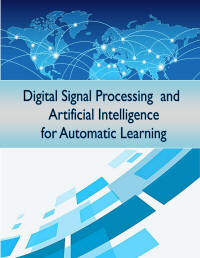| Welcome to Editorial Manager for | |
|
International Journal of Digital
Signal Processing and Artificial Intelligence for Automatic
Learning |
 |
| ISSN: 2583-5009 | |
| About the Journal |
|
The journal Digital Signal Processing and Artificial Intelligence for Automatic Learning (AL) invites submissions of original contributions. AL usually plays an important role in transitions from data storage to decision support systems based on very large signal databases, such as the data obtained from sensor networks, internet services, or communication systems. These systems stimulate the development of both computational solutions and novel models. Signals from real-world systems, such as speech, music, biomedical, and multimedia systems, are usually quite complex, making digital signal processing very useful for the automation of analytic operations to retrieve information from data storage.
Topics will range from foundations for real-world systems and speech processing to language analysis, biomedicine, convergence and complexity analysis, machine learning, social networks, sparse representations, visual analytics, and robust statistical methods.
This journal solicits papers on machine learning approaches for all aspects of digital signal processing and artificial intelligence with regard to AL, including (but not limited to) topics such as: |
| Topics covered include |
| Learning theory |
| Cognitive information processing |
| Neural networks |
| Classification and pattern recognition |
| Nonlinear signal processing |
| Graphical models and kernel methods |
| Genomic signals and sequences |
| Multichannel adaptive signal processing |
| Kernel methods and graphical models |
| Sparsity-aware learning |
| Subspace/manifold learning |
| Bayesian and distributed learning |
| Smart grids, games, and social networks |
| Computational intelligence |
| Data-driven adaptive systems |
| Measurement Analysis Techniques |
| Data-driven models |
| Multimodal data fusion |
| Multiset data analysis |
| Perceptual signal processing |
| Applications (biomedical signals, biometrics, bioinformatics) |